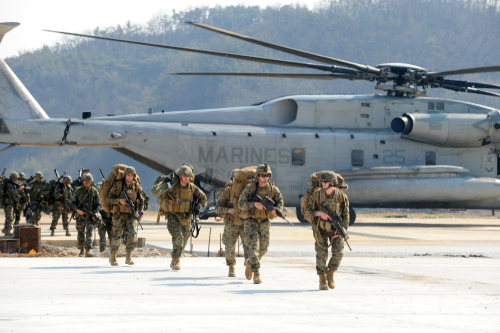A significant change in U.S. military strategy, President Trump’s decision to stop airstrikes on Yemen’s Houthi rebels could put regional security at risk as experts caution the Iran-backed group may take advantage of the move to regroup and re-arm. Following months of heightened U.S. bombing campaigns that reportedly killed hundreds of Houthi fighters but did not prevent their attacks on shipping vessels in the Red Sea, Oman mediated the ceasefire. Without a comprehensive strategy to address the growing threat, America may soon face a more dangerous, better-armed terrorist organization operating with impunity in this critical strategic region.
Trump Announces Bombing Halt as Houthis Deny “Capitulation”
President Donald Trump recently announced that the United States would stop bombing Yemen’s Houthi rebels, claiming the group had expressed a desire to cease fighting. This dramatic policy shift follows over 800 U.S. strikes on Houthi targets since March, which the military reports killed hundreds of fighters and leaders.
President Trump claims that Yemen's Ansarallah movement (Houthis) have capitulated, announcing that they 'don't want to fight anymore'
Trump says the US will no longer continue its bombing campaign against Yemen, and the decision to stop the attacks is 'effective immediately'. pic.twitter.com/5shqqiwYfI
— DocReQ (@DocReQIsBack) May 6, 2025
Despite Trump’s assertion that the Houthis have “capitulated,” senior Houthi official Mohammed Abdul Salam rejected this characterization, claiming that “the American position” had changed while the Houthi stance remained firm. The agreement, brokered by Oman, reportedly ensures that neither side will target the other, allowing freedom of navigation in the strategic Red Sea and Bab al-Mandab Strait.
Iran Connection Raises Serious Security Concerns
A concerning report highlights Iran’s substantial support for the Houthis, including providing training and advanced weapons through smuggling operations that utilize Oman as a primary route. Security experts warn that the Trump administration must remain vigilant against the threats posed by the Houthis and their international supporters, particularly Iran, which has been strengthening the group’s military capabilities since 2014.
.@POTUS halts U.S. airstrikes on #Houthis after they vowed to stop targeting U.S. ships, just before his trip to the region. Strategic pause or diplomatic win? Timing raises questions as #Yemen tensions linger. pic.twitter.com/WH2NZLls3y
— Washington Center for Yemeni Studies (@WCYSUS) May 6, 2025
Jonathan Schanzer, a security expert, expressed grave doubts about Oman’s role, stating: “To hold them up as responsible intermediaries when they are hosting the very group that we’re trying to dismantle, there’s very little logic in this position.” Omani institutions have reportedly been involved in supporting both the Houthi economy and their arms supply chain, raising questions about their suitability as a neutral mediator in the conflict.
Experts Call for Comprehensive Strategy Beyond Military Action
Security analysts emphasize that the cessation of airstrikes should be part of a broader, long-term strategy rather than an end in itself. The Houthis have historically used previous ceasefires to regroup and strengthen their position, suggesting that without additional measures, this pause in hostilities may ultimately benefit the terrorist organization.
“Compelling the Houthis to halt attacks on shipping is a meaningful achievement only if it is part of a broader, long-term strategy,” warned Ari Heistein, highlighting the need for a multifaceted approach.
The report recommends a comprehensive strategy involving military, economic, diplomatic, and soft power measures to counter the Houthi threat effectively. Heistein cautioned that without such an approach, the U.S. and its allies could soon be confronting a more dangerous, better-armed terrorist group.
The ceasefire notably does not include an end to Houthi attacks on Israel, which recently responded with airstrikes on Sanaa’s airport, destroying several aircraft. Israeli Prime Minister Benjamin Netanyahu made his position clear following these strikes: “I have said many times that whoever attacks the State of Israel will pay the price.”
Since November 2023, the Houthis have targeted numerous merchant vessels in the Red Sea and Gulf of Aden, claiming to support Palestinians in the Israel-Hamas conflict. The group has controlled much of northwestern Yemen since 2014, when they ousted the internationally recognized government, triggering a devastating civil war that continues to destabilize the region and threaten American interests.
Sources:
https://www.bbc.com/news/articles/cglxl67g28no
https://thehill.com/policy/international/5288802-us-houthis-ceasefire-iran/

